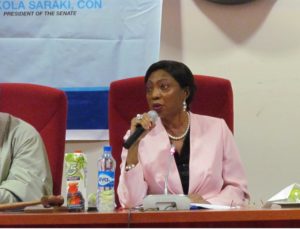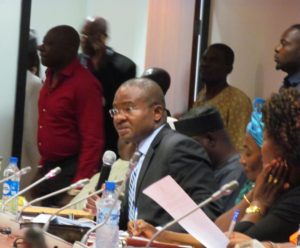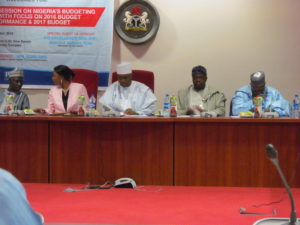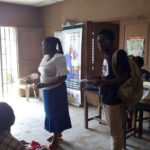In a bid to safeguard transparency and accountability around several themes concerning the Budget, the Committee on Diaspora and Non-Governmental Organisations (NGOs) of the Nigerian Senate in collaboration with Policy and Legal Advocacy Centre (PLAC) and UK Department for International Development (DFID) on Wednesday, November 3rd, 2016 hosted an Interactive Session. The Session was between the Senate Committee on Diaspora and Non-Governmental Organisations and Civil Society Organisations on Nigeria’s Budgeting System with a Focus on 2016 Budget Performance and 2017 Budget.
The President of the Senate, Dr. Bukola Saraki was available to declare open the Interactive Session. He stated, “The implementation of the 2016 Budget is still ongoing” and added that, “Non-oil revenues are also falling out of projection, affecting the Budget implementation.”
 The Chairman, Senate Committee on Diaspora and Non-Governmental Organisations, Senator Rose Oko gave her opening remarks and extensively gave commended the efforts of the NGOs and CSOs partnership that has yielded a whole lot of benefits over the past years.
The Chairman, Senate Committee on Diaspora and Non-Governmental Organisations, Senator Rose Oko gave her opening remarks and extensively gave commended the efforts of the NGOs and CSOs partnership that has yielded a whole lot of benefits over the past years.
She said, “At the first session held at Transcorp Hilton on 8th of February 2016, a consensus was reached that a Memorandum of Cooperation be developed.”
According to her, “On the 10th February 2016, another session was held in the Senate Conference room and was attended by the Senate President. A Major outcome of the meeting was the strong position canvassed by the CSOs seeking to be involved in the budgetary process in the National Assembly. The Senate believes that the involvement of CSOs would add value to the budgetary process of the National Assembly.”
She went further to say, “Senate reasoned that their involvement would also help to improve service delivery as government would feel pressured to perform better based on the CSOs budget analysis, general oversight role and information dissemination.”
“Senate therefore considered that the participation of CSOs could strengthen the legislators’ functions on budgetary matters by way of delivering research-based evidence and advice to members of the National Assembly”.
Senator Rose Oko reiterated further that the Senate, “Will use this forum to develop a functional framework that will enable us to achieve enhanced results in the budget system. Fundamentally, this meeting will offer us a crucial window to preview and endorse our Memorandum of Cooperation with a view to affirming the direction of our partnership. This development would enable us to commence without further delay, mutual activities and joint actions beneficial to our Nation”.
She congratulated us all and welcomed us to this new bond of a working relationship between the CSOs and Legislature.
 The Chairman of PLAC, Mr. Clement Nwankwo was in attendance and also gave insightful tips on how the Senate can gain the CSOs trust.
The Chairman of PLAC, Mr. Clement Nwankwo was in attendance and also gave insightful tips on how the Senate can gain the CSOs trust.
He said, “We want to see the figures reeled out as to what has been achieved”. He expressed further that, “The executives should explain to the masses what has happened to the 2016 budget.”
To bring his remarks to a close, he said, “CSOs have questions to ask” and that, “We hope the partnership between CSOs and the Senate will bring good results.”
In attendance also was Dr. Otive Igbuzor, the Executive Director, African Centre for Leadership, Strategy and Development. He gave a detailed speech tailored towards ensuring mutual harmony of the CSOs and Legislature, he was, however very brave to point at the hollow points in the designing strategies of the budget and gave a broader overview.
In his remarks he said, “In Nigeria, there are a lot of blockages to effective budgeting. First and foremost, the budgetary process is not participatory. Citizens and communities do not participate in formulating policies and agreeing on projects that go into the budget. Meanwhile, It has been documented that wherever participatory budget is implemented. It has expanded citizenship, empowered excluded groups, redeemed rights, deepened democracy and stimulated civil society.”
He said, “The budgetary process is not open. Corruption in any country starts from the budgetary process. In very corrupt countries, the budget is done in secrecy. Releases are done without the knowledge of citizens. Procurement information is not made available to Citizens and corruption is guarded and protected.”
He went further, “A budget is regarded as open if Citizens have access to the key budget documents; have high level of involvement in the budgetary process and have access to procurement information.”
Still on citizens participation in the budgetary process, Dr Otive said, “As a matter of fact, democracy will be meaningless if the citizens do not participate in how government raise and spend money. This is why the tool – Open Budget Survey Tracker – developed by the International Budget Partnership is a very useful instrument.”
What he said concerning the budget not being in accordance with the development challenges of the country is that, “There is no synergy between plans, policy and budget. We have always argued that there is the need for better public finance management across the world because of increasing inequality and non-inclusive growth. The past five decades have witnessed monumental changes in the world. Global economic wealth has increased sevenfold and average incomes have tripled.”
He said there are frivolous expenditures in the budget that will not stand any reasoning and logic. “For instance, the Centre for Social Justice documented N668.8 billion frivolous expenditure in the 2016 budget. They include N3.91 billion allocated annual reporting maintenance of villa facilities; N322.4 million for linking of cable to drivers rest room at the villa; N213.8 million for linking cable from guest house to generator house etc.”
He was quick to point at the institutions and mechanisms for oversight of the budgetary process as being weak. He said, “In any modern democracy, the legislature, civil society and media are expected to play oversight functions in addition to the internal control system in place by the executive.”
According to him, there were many lessons learnt from the 2016 budget implementation, some of which are: the Engagement by Citizens and citizens’ groups produced some positive reports in terms of reduction of frivolous expenditure. For instance, CSJ documented a total saving of N71,954,532,546.00 from the 2016.
 “Delay in passage of budget continued in 2016. This has the potential to affect budget performance negatively. There was low capacity in understanding the new budgetary approach of zero base budgeting on the part of public servant and civil society,” he asserted.
“Delay in passage of budget continued in 2016. This has the potential to affect budget performance negatively. There was low capacity in understanding the new budgetary approach of zero base budgeting on the part of public servant and civil society,” he asserted.
He also made a deep dive into how Civic Education, Social, Economic and political resilience, budget literacy, comparative analysis of best practice in budgeting are the issues that formulate emerging consensus among civil society that needs to be addressed going forward.
According to Dr. Igbuzor, there are three ways we could measure the impact level performance of the 2016 budget, they are: Input Level, which is how much of the budgeted amount was released and used in the implementation.
Process, how the activities were carried out. Procurement process asks if the activities are carried out as and at when due.
Output, Outcome and Impact levels concerns the immediate result of the activities. The effect of the budget activities or any change attributable to the budget actives and Change in people’s lives attributable to the budget respectively.
He lamented that, “For a very long time, Nigeria had no institutionalised monitoring and evaluation system where there is a regular production of monitoring information; regular production of monitoring findings; and monitoring and evaluation findings are used to improve government performance.”
In conclusion, he commended the National Assembly for the interactive session. He stated, “We need to go a step further by ensuring public hearing in the budget at all levels: Federal, State and Local Government. I undemanding that the leadership of the National Assembly has agreed on the need to subject the budget to Public hearing. The 2017 budget should be the beginning point.”
Positive reactions and towards his remarks came from different sections of the room.
Critical observations and assessment of Citizens’ priorities in Budgeting Formulations was made by Barrister Eze Onyekpere of the Centre for Social Justice.
The representative of Department of International Development prayed prayed that, “It will be helpful if you can ensure this becomes a norm and part and parcel of the legislation in terms of what concerns the citizens.”
The Chief Executive of Connected Development, Hamzat Lawal who was present at the Interactive Session raised the tempo of the hall when he greeted with the assertion that, “There’s a World Bank intervention fund for PHCs across Nigeria, we just came back from Akwa Ibom, Kogi, Osun, Yobe, Enugu, Osun and Kano as we seat, nothing has been done.”
Senator Tejuosho, Chairman Senate Committee on Health also mildly acknowledged that, “Of course The Health Act is one of the declarations that I know we are violating”.
Senator Rose Oko, in her closing remarks said, “We need to work together, the CSOs and the Nation Assembly need to work together.”
“We will recommend a resolution of this interactive session to the Senate for approval”.
Lastly, she assured that, “We will make available to you the conclusion of this meeting.”
The Senate was reminded of their promise that, ”You made a promise to #OpenNASS, please open it up” and this, to me was the highpoint of the Interactive Session.
AboutHamzat Lawal
Comments (02)
Leave a Reply to is pudenduszenuwbeschadiging permanent Cancel reply
This site uses Akismet to reduce spam. Learn how your comment data is processed.


שרה בתאריך ויאגרה 50 מ ג מחיר לקבל.
למי לפנות. c-c ויאגרה 50 מ ג מחיר לתת המלצות פרקטיות.
כאשר עזרו לי לקום הרגשתי סחרחורת,קשיים בנשימה,כאבי ראש ושיעול.
במקרה שהנגעים יחידים, זה יכול להיות פתרון.
Seks fotoğraf sıcak fotoğraf. 8238. fotoğraf sex resim sex fotoğraf hint
seks görüntüleri bedava sex resimleri sex fotoğrafı www sex fotoğraf
S kızlar sex.